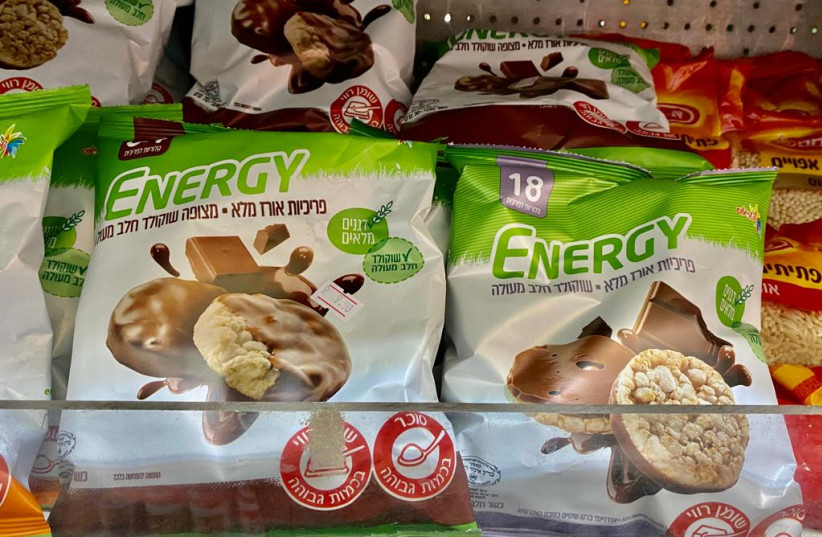The Strauss Company's salmonella scandal continued to make waves on Tuesday, as four people – all of whom consumed Strauss products within the last few days – went to the hospital with apparent symptoms of food poisoning.
Three of them are still awaiting diagnostic results. However, a fourth patient – a child who arrived at Samson Assuta Ashdod Hospital a few days ago with symptoms indicating a possibility of salmonella – has since returned home and received diagnostic results that indicate it was not salmonella, KAN News reported on Tuesday afternoon.
An additional possible case was detected in a child, also at Assuta Hospital. Test results, in that case, are still pending.
Additionally, a 27-year-old man arrived at Ichilov Hospital suffering from symptoms of salmonella (vomiting, abdominal pain and fever) for the past four days, after he consumed chocolate products before the recall was issued.
An update from the hospital said the man received treatment in the emergency department and was released home after several hours. Dr. Alawi Tarwat, the attending physician, said that the individual, who presented all the clinical symptoms associated with salmonella, is expected to receive diagnostic results by tomorrow.

The fourth possible salmonella case was reported by a 37-year-old woman in Jerusalem who arrived at the Terem Emergency Medical Center with symptoms of salmonella poisoning. According to her report, she had consumed a significant amount of chocolate on Monday morning, just prior to the recall announcement.
On Monday evening, she began exhibiting symptoms that got progressively worse throughout the night until she arrived at the emergency center. She was treated with fluids and antibiotics and released home several hours later.
However, as there has been no confirmation that these cases are indeed salmonella, or that the sickness was directly caused by Strauss chocolate, both health professionals and the company are urging people not to rush to conclusions.
“The sickness can be due to a number of reasons, and there is no way to directly link it to the recall of the chocolate products,” said Terem Medical Center director Dr. David Zlotnik.
Since the initial recall on multiple Strauss-Elite chocolate products, other recalls have also been announced in connection to the salmonella contamination, including one from Unilever Israel, as many of their products are made using raw ingredients provided by Strauss’s Elite facility.
Aroma Israel announced on Tuesday morning that it would no longer be providing the square of Strauss chocolate that they are known for giving customers along with their drinks.
“We were updated on the recall from the Tufinit company that supplies the chocolates to the chain,” Aroma said in a statement. “We immediately stopped the distribution of chocolates in all the chain’s branches, and we also updated the Health Ministry.”
The Health Ministry issued a statement clarifying the chain of events following the initial detection of salmonella at the Strauss factory, after drawing criticism that almost a week passed between the detection of the contaminant and the announcement to the public.
According to the ministry statement, salmonella was first detected in the manufacturing plant on April 19, however, it was not detected in the samples that were taken from finished food products. As a result, the company was instructed by the Health Ministry to continue conducting tests of the production facility and the raw ingredients.
Then, on the evening of April 21, a preliminary report showed indications of salmonella being present in the raw material. However, because this was detected through a rapid test and not a full laboratory test, the manufacturer was not required by law to issue a recall at that stage.
The final test results were presented to the Health Ministry on Sunday afternoon, and indicated clear evidence of salmonella contamination in the production environment and finished food products. A recall was then issued on Monday morning.
An investigation into the production facility has now been launched overseen by the Health Ministry’s Food Service Department. The company is required to submit the findings and take corrective actions to prevent such an event from occurring again.
“The return to production will be done after the completion of the incident investigation, the performance of actions to prevent a recurrence, the cleaning and disinfecting of the [production] lines and after proper inspection and full laboratory testing at our office,” a Health Ministry spokesperson explained. “The Health Ministry continues to closely monitor and investigate the incident, and based on the findings, further steps will be taken. [We] will continue to act with all the means at our disposal in order to maintain the safety of the products and the health of the Israeli public.”
Public Health Services head Dr. Sharon Alroy-Preis reassured the public at a news conference on Tuesday that while she does not believe Strauss Group concealed information about the processing facility from the Health Ministry, the possibility will be checked.
“When salmonella is present, one should check what the source is,” said Alroy-Preis. “As a precaution, they [Strauss] went back further than needed. These are popular products and as a precaution, extensive recalls have been made.”
Health Minister Nitzan Horowitz also released a statement on his Twitter page earlier in the day, saying: “The Strauss plant will not return to operation until we reach the unequivocal conclusion that there is no danger to the public. At the same time, the incident will be fully investigated, and the deputy-general of the ministry has already opened a comprehensive investigation. This is a good example of why regulation is needed, and why the state needs to monitor [production], especially when facing strong corporations.”
